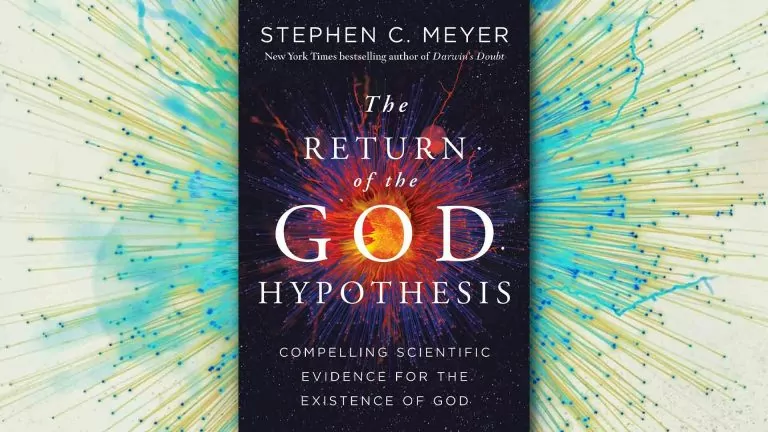Stephen C. Meyer’s Return of the God Hypothesis continues to receive accolades. Most recently, World magazine chose it as one of their 2021 books of the year. On Amazon, as I write, it’s currently the #1 best-seller under “Creationism” and #4 under “Science & Religion.” This is an important and influential book coming out of the Intelligent Design movement.
However, from a biblical perspective, it has several glaring problems.
The subtitle reads, “Three Scientific Discoveries that Reveal the Mind Behind the Universe.” Those three “discoveries” are:
- the Big Bang
- the fine-tuning of the universe
- the existence of highly-detailed DNA information.
Meyer works with these three to argue for the eminent plausibility of the “God hypothesis.”
1. The Big Bang
While I’m not qualified to evaluate the scientific evidence for the Big Bang, I do know that Big Bang cosmology is not consistent with the biblical account of origins. In a video on this subject, Christian astrophysicist Dr. Jason Lisle explains how Big Bang cosmology and the Bible conflict at several key points.
- They conflict on the method of creation; the Big Bang says that the universe came into existence naturalistically, whereas the Bible says that it was created supernaturally by God.
- There’s also a conflict on the time scale; Big Bang cosmology says that it happened billions of years ago, whereas the Bible says that creation happened several thousand years ago.
- The order of events is different, with the Bible saying that the earth is made before the stars.
- Finally, Dr. Lisle points out how they each tell a widely different story of the future. Big Bang cosmology posits a universe that will eventually end in heat death. The Bible says that God will judge all people and then there will be a new heavens and new earth where God will dwell with the redeemed.
The Big Bang irreconcilably contradicts the Bible. A Bible-believing Christian can’t use something that contradicts God’s Word in order to argue for the likelihood of the existence of God. That brings us down to two scientific discoveries.
2. Fine-tuning
I won’t say much about the second one, the fine-tuning of the universe. Given what the Bible says about God as our wise and good Creator, one would expect what Paul Davies is quoted as saying:
“The really amazing thing is not that life on earth is balanced on a knife-edge, but that the entire universe is balanced on a knife-edge, and would be total chaos if any of the natural ‘constants’ were off even slightly.”
While Meyer’s argument is that this fine-tuning points to the probability of a Creator (more on the problematic nature of that in a moment), the fine-tuning of the universe is indeed an observation consistent with the revelation of who God is in the Scriptures.
3. DNA information
When arguing for the “God hypothesis” with DNA information, Meyer makes his case using what’s called “deep time.” Contrary to what the Bible indicates, Meyer believes the earth has a history involving hundreds of millions of years. In fact, chapter 10 is entitled, “The Cambrian and Other Information Explosions.” The Cambrian explosion allegedly took place 530 million years ago. As the story goes, this involves an explosion of new life forms in the fossil record. Meyer argues that this also represents an explosion of biological information. It poses a difficulty for materialistic theories of biological evolution, but could possibly “also provide positive evidence for intelligent design” (p.209).
However, for a Bible-believing Christian, the problem is that God said he created the heavens and the earth at the beginning (Gen. 1:1) – and Jesus said that God created Adam and Eve at the beginning (Matt. 19:4). If you subsequently take the genealogies of Scripture seriously, even granting some gaps, you’re left with a world with an age on the order of thousands of years, not millions.
Some value
Now before I get to the most serious issues with The Return of the God Hypothesis, let me say that Bible-believing Christians can get some value out of it. Some of the value comes when Meyer is critiquing materialist scientists.
For example, Stephen Hawking is quoted as saying, “Because there is a law of gravity, the universe can and will create itself from nothing.” But Meyer points out that:
“causes and scientific laws are not the same things…The laws of physics represent only our descriptions of nature. Descriptions in themselves do not cause things to happen.”
There’s yet more value in Meyer’s critique of prominent theistic evolutionists like Deborah Haarsma of BioLogos.
I also appreciate his setting the historical record straight on Isaac Newton and his alleged “God-of-the-gaps blunder.” As Meyer describes it,
“Supposedly, Newton invoked specific acts of God (or angels) to occasionally fix the orbits of the planets and to compensate for Newton’s inability to describe the regular motion of those planets accurately.”
However, when Meyer went back to the original source, Newton’s Principia, he discovered that Newton didn’t posit this kind of divine action at all. The story is completely false.
Finally, Meyer illustrates how materialist scientists and philosophers live contrary to the beliefs they profess to hold. For example, David Hume questioned the uniformity of nature. This is the idea that, in the future, the world will act as it has in the past. While Hume questioned it, he still acted as though he believed in it, just as every skeptic does when he walks through a door rather than a window. As Meyer notes, “All of us act as though we believe the world in its most fundamental regularities, will behave in the future the way that it has behaved in the past.” Alvin Plantinga furthers this point, in noting that, if evolutionary naturalism is true, “we have significant reason to doubt the reliability of our minds.” Charles Darwin had already identified this problem in an 1881 letter:
But then with me the horrid doubt always arises whether the convictions of man’s mind, which has been developed from the mind of the lower animals, are of any value at all or at all trustworthy. Would anyone trust in the convictions of a monkey’s mind, if there are any convictions in such a mind?
Yet no one really does doubt in this way. To do so would ultimately be self-defeating, since we would also have to doubt our beliefs about evolutionary naturalism. This is a good example of answering a fool according to his folly (Prov. 26:5).
Too tentative
My two biggest beefs with Return of the God Hypothesis have to do with the method of argumentation and the conclusion which results. There are these three scientific discoveries mentioned earlier. Meyer incorporates these discoveries into what’s called an abductive argument for the existence of God. Such an argument works by way of inference to the best explanation. It takes this form:
Logic: If A were true, then C would be as a matter of course.
Data: The surprising fact C is observed.
Conclusion: Hence, there is reason to suspect that A is true.
Filling it out, it looks something like this:
Logic: If a personal God existed, then DNA information would be as a matter of course.
Data: The surprising fact of DNA information is observed.
Conclusion: Hence, there is reason to suspect that a personal God exists.
One of the crucial things to note here is that the “logic of abduction…does not produce certainty, but instead plausibility or possibility.” This tentativeness is reflected throughout Meyer’s book. His argument is ultimately that “the God hypothesis” is possibly the best explanation of the three scientific “discoveries” discussed. So: a personal God quite likely exists.
From a biblical perspective, this is unacceptable. The Bible doesn’t reveal the existence of God to us as a likelihood, but a certainty. His existence is real and on some level everyone knows it (Rom. 1:18-20).
Furthermore, the idea that God is a hypothesis to be tested or evaluated by sinful creatures is repugnant to biblical revelation. The creature ought never to stand in judgment over the Creator or reduce him to a hypothesis. Human beings have no right to judge God’s existence or anything else about who He is or what He does. The whole premise of Meyer’s book flatters people into thinking they do have such a right. That’s not a minor procedural peccadillo, but a massive misstep, even an affront to the Creator.
Too general
Meyer’s conclusion has another problem embedded in it. He argues for the plausibility of the existence of a personal God. In chapters 13 and 14, his reasoning excludes pantheism and deism as possibilities. That leaves him with a God who is personal and involved with his creation, not only at the beginning, but on an ongoing basis. But the problem is that this is still not the God of the Bible. Meyer’s God who very likely exists could be the Allah of the Muslims, the God of the Jews, the Jehovah’s Witnesses, or the Mormons. What we’re left with is plain vanilla theism. Meyer has argued for a god, but not the Triune God of the Bible, and certainly not for the biblical worldview package. Meyer professes to be a Christian, but his book could just as well have been written by a Jew or Muslim.
Conclusion
Ultimately all the problems in Return of the God Hypothesis trace back to one fundamental difficulty in Meyer’s method: he doesn’t start with the Word of God. Instead, he starts with the notion of neutral intellectual ground. He doesn’t seem to apprehend that the problem with unbelief isn’t intellectual, but moral. There is no neutrality.
Those who reject the God of the Bible are rejecting him because of the wicked rebellion in their hearts. It’s this foundational issue that really needs to be addressed. Meyer doesn’t do that. In his book, there’s no sin from which unbelievers need to repent. There’s just errant thinking that needs more information and sounder logic. In his book, there’s no Saviour to whom unbelievers need to turn, no gospel to deliver from vanity and futility. There’s just science and logic putting our minds at ease about origins. I bought Return of the God Hypothesis in a Christian bookstore, but I really don’t know why it was there. Even if Christians may find some things of value, it’s not a Christian book.
For a far better biblical alternative, I highly recommend Jason Lisle’s The Ultimate Proof of Creation: Resolving the Origins Debate.
Dr. Wes Bredenhof blogs at Bredenhof.ca.











